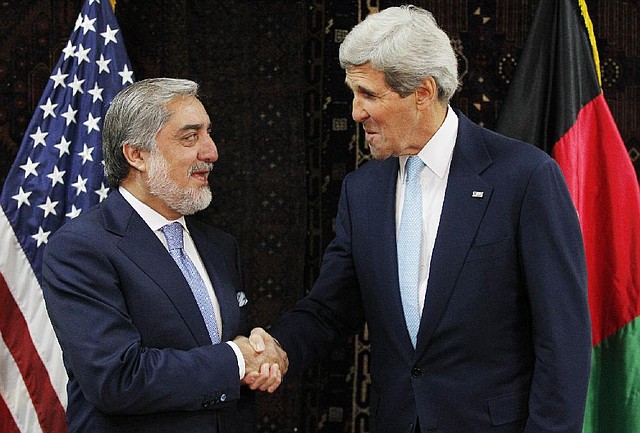In Kabul, Kerry tackles election crisis
Afghan presidential candidate Abdullah Abdullah, left, shakes hands with U.S. Secretary of State John Kerry at the start of a meeting at the U.S. Embassy in Kabul, Friday, July 11, 2014. Kerry sought Friday to broker a deal between Afghanistan's rival presidential candidates as a bitter dispute over last month's runoff election risked spiraling out of control. (AP Photo/Jim Bourg, Pool)
Saturday, July 12, 2014
KABUL, Afghanistan -- U.S. Secretary of State John Kerry began a series of meetings in Kabul on Friday in hopes of finding a way to resolve a presidential election crisis that has threatened to split the Afghan government and prompted Western officials to warn that Afghanistan risked losing billions of dollars in aid.
Kerry arrived after midnight for the hastily arranged visit, landing in Kabul hours after a new United Nations proposal failed to bridge the divide between the two candidates, Abdullah Abdullah and Ashraf Ghani Ahmadzai. Both have acknowledged the election was marred by widespread fraud, but each campaign has claimed victory, with Abdullah this week threatening to declare himself president if the allegations of vote-rigging were not adequately addressed.
The prospect of Abdullah, who has the support of many powerful former warlords, attempting to seize power added a new layer of peril to the crisis. It raised the possibility of Afghanistan's fragile government and security forces fracturing, possibly along regional and ethnic lines, just as U.S.-led combat forces are preparing to withdraw.
Faced with the possible fracturing of a government the U.S. has spent billions of dollars to build and lost thousands of soldiers defending, President Barack Obama's administration this week began moving off its long-held position that the election was an issue for Afghans to work out among themselves. Obama called both candidates after Abdullah's warning, and Kerry added a stop in Afghanistan to a trip he was already making to Asia.
Kerry's first meeting Friday was with Jan Kubis, the U.N. special envoy for Afghanistan. Kubis' proposal, which called for a special audit of votes from 8,000 polling stations, or about 43 percent of the ballots cast, failed to win the approval of the Abdullah campaign, which wanted 11,000 polling stations examined.
Kerry then met President Hamid Karzai, who remains powerful and whose backing is crucial to any deal that could end the crisis. Although Karzai has sought to remain publicly above the fray, Afghan officials close to the president have said he has shaped the election process in favor of Ahmadzai, a longtime adviser and former finance minister. The Abdullah campaign has accused Karzai of rigging the election, which he denies.
Kerry is one of the few U.S. officials with whom Karzai still enjoys a relatively warm relationship. But it is tainted by Karzai's bitterness over the last presidential election, in 2009, during which he believes the U.S. tried to engineer his removal as president. The vote was similarly filled with fraud, and it was Kerry who persuaded Karzai to agree to a runoff that year, which the Afghan leader saw as a humiliation.
Karzai's challenger in 2009 was Abdullah, a former foreign minister who eventually dropped out of the race. And though U.S. mediation had averted a crisis, it left both Karzai and Abdullah bitter and mistrustful of the U.S.
Kerry, who was also planning to meet Friday with both candidates, would have to overcome those sentiments if he is to have any chance of brokering a solution to this year's postelection dispute. But some of Abdullah's supporters said they see Kerry and the rest of the international community as their best case for a fair hearing.
"We want the international community to take action and we want real democracy," said Mustafa Sattari, a doctoral student who was among a group of about 40 protesters, some of whom had formed a human chain blocking the entrance to Kabul's airport Friday.
Some of the protesters expressed frustration with democracy in general. "The last election was a mess and this one as well," said Noor Azizi, 24, a marketing officer in a private company.
Kerry, in brief comments to reporters ahead of his meeting with Kubis, cautioned that there was no guarantee of success.
"The future potential of a transition hangs in the balance, so we have a lot of work to do," he said. "But I can't tell you that that's going to be an automatic at this point."
Kubis added that the U.N. was searching for an election result "that strengthens stability and unity in the country, and not the other way around."
A Section on 07/12/2014

